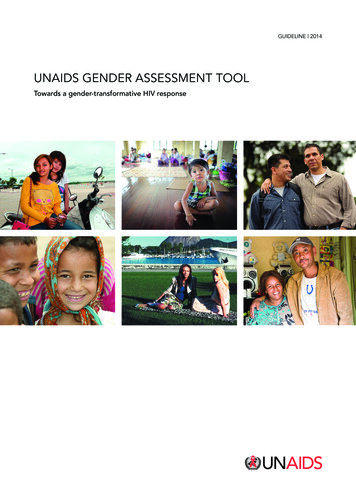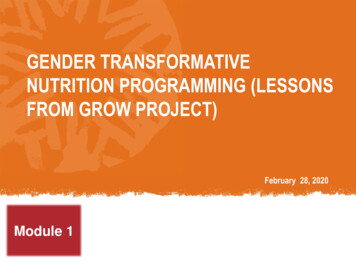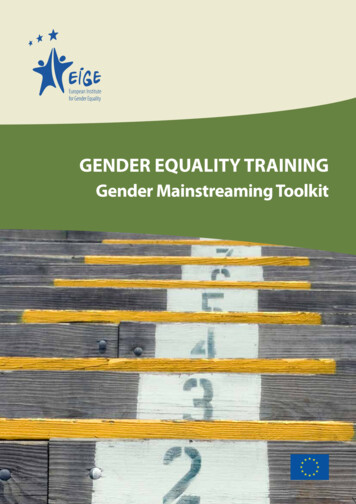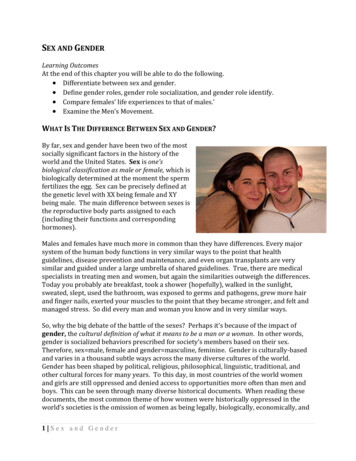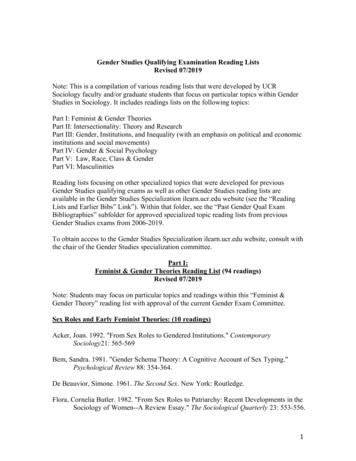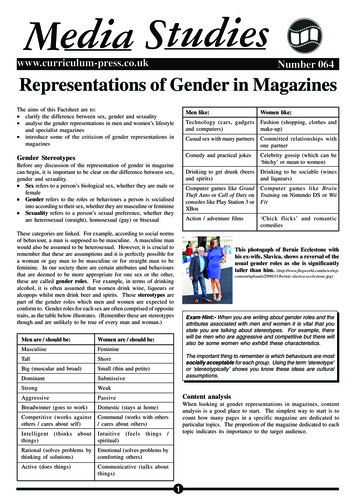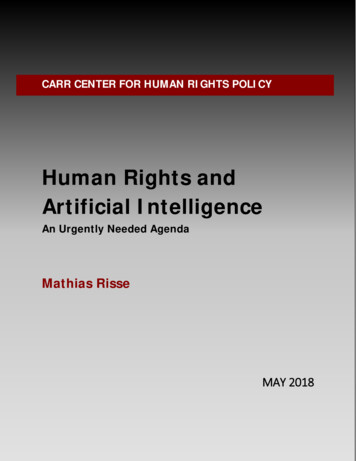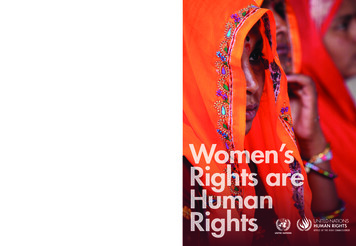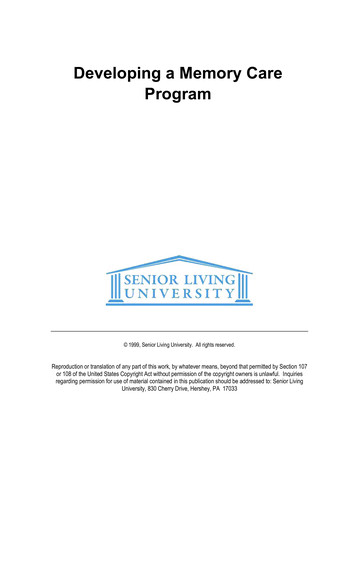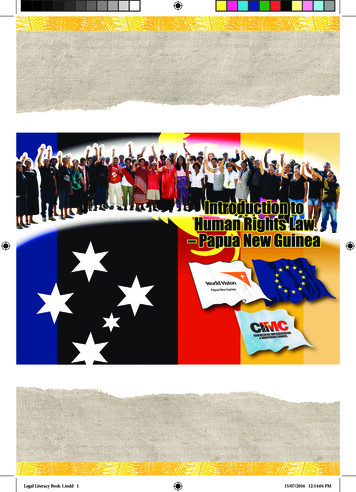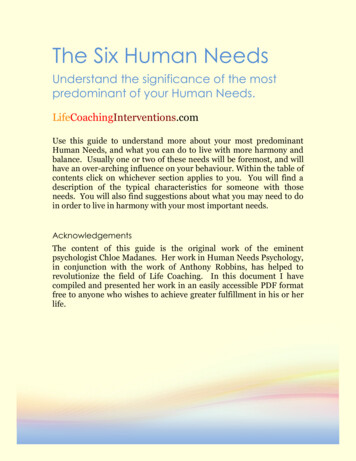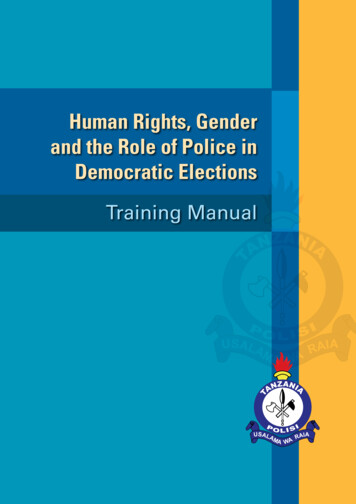
Transcription
Human Rights, Genderand the Role of Police inDemocratic ElectionsTraining ManualHuman Rights, Gender and the Role of Police in Democratic Elections - Training Manual1
2THuman Rights, Gender and the Role of Police in Democratic Elections - Training Manual
Human Rights, Gender and the Roleof Police in Democratic ElectionsTraining ManualFirst Edition 2005Second Edition 2010Third Edition 2015Human Rights, Gender and the Role of Police in Democratic Elections - Training Manuali
Table of ContentsPREFACE.iiiAIMS OF THE TRAINING PROGRAMME ON HUMAN RIGHTS,GENDER AND ROLE OF POLICE DURING ELECTIONS.ivCHAPTER 1 - Introduction to human rights.1CHAPTER 2 - Policing in a democracy.9CHAPTER 3- Gender, diversity, social inclusion and elections.17CHAPTER 4 - Community policing.24CHAPTER 5 - Conflict resolving.32CHAPTER 6 - Maintenance of public order.45CHAPTER 7 - Arrest.53CHAPTER 8 - Use of force and firearms.63CHAPTER 9 - The role of police in elections.70CHAPTER 10 - Human rights violations.85CHAPTER 11 – Safety procedures for security forces dealing with the media.92iiTHuman Rights, Gender and the Role of Police in Democratic Elections - Training Manual
PREFACEThis manual on Human Rights is unique in one respect. It is designed to impart human rights principlesto Tanzanian police officers in order to equip them professionally for the crucial functions they areexpected to discharge during the electoral process. The protection of human rights is part and parcelof the exercise of routine police functions. However in an electoral process, the loftiest exercise of thedemocratic rights of citizens, the protection and observance of human rights comes sharply in focus.Human rights principles embody generally accepted principles of fairness and justice. The electoralprocess involves three important stages: the run up to the elections when there are public meetings,marches etc. by political parties with contending interests, the polling day when the citizens cast theirballots while the police are required to ensure that balloting takes place in an atmosphere of peace andtranquillity and the post-election stage when citizens adopt various forms of expressing their views andopinions. Both stages bring concrete challenges to the policing function. Police officers must be able tonavigate and negotiate through these contending interests with fairness and impartiality. Above all theyshould view themselves as facilitators of the democratic process and strive to avoid the taking of anyarbitrary measures which would inhibit the exercise of democratic rights by the citizens.Policing or law enforcement properly so called, is indeed an exercise in the protection of human rights.The United Republic of Tanzania ratified and domesticated the major international instruments aimedat protecting human rights. A few examples will suffice to illustrate this point. The Bill of Rightswhich forms part of both the Constitutions of the United Republic of Tanzania and the Constitutionof the Revolutionary Government of Zanzibar1 is a tangible expression of adherence to the UniversalDeclaration of Human Rights, a major international instrument for the protection of human rights.Prominent among the categories of rights embodied in both the constitutions are the right to freedomof assembly, freedom of association, participation in public (political) affairs, personal freedom, just tomention a few. Further the right to life as expressed in the International Covenant on Civil and PoliticalRights finds its concrete expression in the Tanzanian as well as Zanzibar laws prohibiting murder andsimilar life threatening acts or omissions as the case may be, and the right to property is upheld by lawsprohibiting arbitrary interference with the citizens’ property.To the extent that the police enforce these laws they are contributing in no small way to the protectionof human rights. Policing is therefore a palpably strategic scheme for the protection of human rights.Indeed police officers are the first line of defence in the protection of human rights.Far from inhibiting the efficiency and effectiveness of the policing function, the observance of humanrights by police officers promotes the objectives of policing in many ways. When police officers observehuman rights they gain the respect and above all the cooperation of the citizens. Public cooperation isa crucial factor in the detection of crime. Public cooperation however, may only be secured where thepolice have the respect and trust of the citizens.This Manual on Human Rights is an important contribution to the professional perfection of Tanzanianpolice officers not only for the democratic management of the electoral process but also for the routineperformance of their functions. It is my sincere hope that all of us will treasure this manual and aboveall treat it as a constant point of reference in the promotion of democratic policing which is the majorobjective of the Tanzania Police Force.ERNEST JUMBE MANGUINSPECTOR GENERAL OF POLICEHuman Rights, Gender and the Role of Police in Democratic Elections - Training Manualiii
AIMS OF THE TRAINING PROGRAMME ON HUMAN RIGHTS,GENDER AND ROLE OF POLICE DURING ELECTIONSThe aim of this training programme is to give police officers the skills necessary: o carry out their “traditional “role as preservers of peace in the context of heightenedTtensions during the election period; o ensure that police officers help to protect the security and integrity of the electoralTprocess, participants, institutions and outcomes; o conduct themselves in relation to stakeholders in the electoral process (e.g. theTprinciple of neutral, discreet and professional policing); iv o ensure that police officers are aware of particular needs and vulnerabilities that mightTimpact certain individuals and segments of society, and be in a position to respond tothese appropriately; o ensure all citizens are able to exercise their democratic rights equally, regardless ofTtheir social status, gender identity, age, disability or any other factor;And to carry out specific tasks on polling day such as accompanying ballot boxes.THuman Rights, Gender and the Role of Police in Democratic Elections - Training Manual
CHAPTERIntroduction to human rights1ContentIntroduction to human rightsLearning objectives for chapter 11.1.Introduction1.2.What are human rights?1.3.What is the role of police officers?1.4.Why are human rights important for police officers?1.5.How may police officers limit the human rights of suspected criminals?1.6.International human rights instruments applicable to police officers1.7.The importance of international standards for Tanzanian Police1.8.Summary/Questions for self-evaluationTraining Manual in Human Rights, Gender and the Role of Police in Democratic Elections1
Learning objectives for chapter 1After completing this chapter you should be able to: 1.1.Discuss the role of police officials in respecting and protecting human rightsDefine human rightsDiscuss the importance of international standards for Police in TanzaniaDiscuss how police can limit the human rights of suspectsIntroductionHuman Rights form the basis for police agencies that will serve and protect all the communitiesin Tanzania in an impartial and professional manner. It is important for all police officers torespect the human rights of all the people that they deal with on a daily basis and all persons intheir custody and care. It is also important for the community to understand the role of the policeofficers. This is even more so during the period of elections where police offers are expected touphold the law, respect the rights of every person while being impartial and professional.Police officers have a very important role in the protection of human rights because of the factthat they are dealing with people on a daily basis, especially with people who are suspected ofcommitting crime and people who were the victims of crime. This is even more so during therun up to the election, during and after the election process where citizens will be more activein expressing themselves, holding meetings, rallies and processions. It is therefore importantfor police officers to understand their role as law enforcement officials and as protectorsand enforcers of human rights. Police officers should also understand the basic principles ofperforming their duty with human rights as the basis for their actions.Police officers are in the position to legally limit some of the very fundamental rights of people,especially people who are suspected of committing a crime, for example during arrest, detention,investigation and searches, and managing crowds and maintenance of public order. There arehowever factors to take into consideration when limiting rights.This chapter is a basic introduction and we will look at human rights in general, how it came about, someimportant international human rights documents, the human rights in legislations of CommonwealthCountries in Tanzania and how important it is for police officers to respect and protect human rights.We will also have a basic look at the role of police officers and how police officers can limit and restrictthe rights of suspects. Some human rights will be dealt with in more detail in other chapters.1.2.What are human rights?There are many definitions of human rights and people differ about the importance of differentrights. Human rights have been defined as ‘generally accepted principles of fairness and justice’or ‘moral rights that belong equally to all people simply because they are human beings’. Thismeans that human rights belong to all people. There are a few principles that can be applied toexplain human rights.2THuman Rights, Gender and the Role of Police in Democratic Elections - Training Manual
PROVIDES MINIMUM PROTECTIONHuman rights are the minimum protection that all human beings have the right to enjoybecause they are humans. Human rights provide a moral recognition of the dignity andequality of all humans and the need to give all humans an opportunity to develop fully. INHERENTHuman beings are born free and equal in dignity and rights - this means that their rightsare inherent - not given, bought, earned or inherited. Just because you are born, you havehuman rights. UNIVERSALHuman rights apply to all human beings. Human rights are generally accepted principles.Human rights are the same for all regardless of race, sexuality, gender, religion, ethnicity,possible disability, political or other opinion, social or national origin - they are universalbecause they are the same for everyone in the world. They are also internationally guaranteed. INALIENABLEHuman rights cannot be waived or taken away - they are inalienable. Human rights cannotbe renounced, lost or forfeited. Some human rights can however be limited - but only inaccordance with the laws of a democratic society and only to the extent necessary in orderto protect the rights of others. The principles of proportionality, legality, accountability andnecessity should guide police officers when limiting the rights of a person. Police officersshould also be able to justify their actions and also be able to indicate that they werereasonable in their actions. EQUALITYAll people have the same human rights. As long as you are a human being you are entitled tohuman rights. Therefore all human beings have the right to equal protection of their rightsand to equal treatment by law enforcement officers. Police officers may not discriminateagainst any person by for example treating them differently because of a persons’ race,gender, colour, sexuality, language, religion, possible disability, political or other opinion,national or social origin, property, birth or other status. INDIVISIBLEHuman rights are based on the principle of respect for human dignity. In order to live indignity, all human beings are entitled to freedom, security and decent standards of living allat the same time - human rights cannot be divided up, they are all interconnected and interdependent, they are indivisible. FUNDAMENTALLife, dignity, and other human values depend on them. Human rights form the basis ofevery human being.Human Rights, Gender and the Role of Police in Democratic Elections - Training Manual3
ABSOLUTEThe core rights are absolute and cannot be limited. Under International Law they are theright to life, the right to be free from torture, the right to be free from slavery and the rightto be treated with dignity. However there are certain human rights that may be limited ifcountervailing social interests are important enough, in particular circumstances, for limitedtimes and purposes to the extent strictly necessary. OBLIGATION OF THE STATEHuman rights are a legal recognition of the obligation of States to provide and guaranteethese rights to the humans under their control.These principles have to be protected and promoted. Human rights may be protected througha Constitution, a Bill of Rights or through the ordinary laws of a country. In Tanzania there isspecial legislation to protect human rights. Every person has the right to enforce their rights,but sometimes human rights can be limited or restricted if they conflict or interfere with therights of others. It is also important to respect the human rights of other people so that they canalso respect your rights.1.3.What is the role of police officers?A police officer is a Law Enforcement Official and according to Article 1 of the United NationsCode of Conduct for Law Enforcement Officials:“Law enforcement officials shall at all time fulfil the duty imposed upon them by law, by servingthe community and protecting all persons against illegal acts, consistent with the high degree ofresponsibility required by their profession.”This means that police officers should at all time respect and protect the law. Not only local ordomestic legislation but also internationally accepted standards and practices. All police officersshould respect the human rights of all suspects, besides that they should also protect the humanrights of every person, for example, against abuse by other officials. This is also applicableduring the election period.1.4.Why are human rights important for police officers?All human beings have basic human rights, regardless of their age, sex, ability or disability, socialor economic background, political opinion or ethnic and religious background. These rightshave to be respected and protected, without discriminating against any group or individuals.Discrimination refers to the unfair, unequal or prejudicial treatment of individuals or groups,for example on the basis of their age, sex, ethnic background or ability/disability. The TanzanianConstitution bans discrimination on any grounds and numerous subsequent laws, governmentpolicies, action plans and the like have further outlined the necessity to pay particular attentionto the needs of women, people with disabilities, youth and other vulnerable groups.4THuman Rights, Gender and the Role of Police in Democratic Elections - Training Manual
All citizens have equal rights and must be treated equally in front of the law. Ensuring equalityand non-discrimination may at times mean treating people differently in order to ensure thatthey are able to exercise their rights, for example assisting people with disabilities (PWD) inaccessing services, or ensuring elderly people or pregnant women are not exposed to strenuoussituations (e.g. queueing for hours at a ballot box).Police officers are in a very unique position. They work with people who break the law and abuseother people’s human rights. During election time even more so where different oppositionparties try to undermine each other and try to stop each other from having meetings, rallies,marches where they express their rights to freely express themselves or associate with their ownpolitical parties. During this period police officers have to be even more vigilant not to be seento side with one group or political party. Police officers must therefore not only be impartialbut must also be seen to be impartial. In the context of elections, they need to ensure citizensare able to vote/participate otherwise in political processes, free from discrimination, verbal orphysical abuse, harassment, and violence, including of a sexual or gendered nature.When police deal with members of the public especially if these people are suspects police havea very important responsibility to respect, protect and promote the basic human rights of everyperson. Unfortunately police officers are not only in the position to respect and protect humanrights, but also to abuse the human rights of people. It is therefore very important for policeofficers to know and understand their role in respecting and protecting human rights. Policeofficers should not only know the human rights of suspects or people in detention, but shouldalso know how to apply these rights, and should also know how to protect and respect theserights against abuse by others, including violations of rights by other police officers.Another aspect of human rights that is equally important for police agencies is the fact that policeofficers are also human beings, and therefore also have basic human rights that should also berespected and protected. An example would be the right of police officers to have good workingconditions. This also includes the right of all officers to be treated with respect and withoutdiscrimination regardless of rank; position; age; sex; social, religious or ethnic background andability/disability.Police services also need to be provided in a way that is in line with regulations and enablespeople with particular needs to access these. For example, cases of sexual and gender-basedviolence (SGBV) and child abuse (CA) need to be handled in an environment which guaranteesconfidentiality, while for example elderly and persons with disabilities may not be able to accessoffices if lengthy staircases are involved.Police officers also have to respect and protect the rights of victims and vulnerable groups insociety. They are there to protect and serve the community they work in. In the context ofelections, particular groups may be faced with particular needs and vulnerabilities or threatswhich police officers need to be aware of and, where necessary and mandated to do so, respondto. These can for example be women, elderly or people with disabilities whose democratic rightto vote is being obstructed; young men who are pressured to join political party youth groups;female candidates who are subjected to verbal and physical abuse, or threats thereof; peoplewith albinism, children or vulnerable men/women who are targeted due to alleged witchcraftpractices; people who are sexually harassed be it at campaign rallies or during voting; real orsuspected supporters of one party who are attacked or threatened by another party’s supportersor uninvolved persons caught in tensions or violence between supporters of opposing parties.Human Rights, Gender and the Role of Police in Democratic Elections - Training Manual5
Police officers can be seen as the first line of protection of human rights. These rights cannotbe taken away arbitrarily and without legal justification. In certain instances, for example whena person breaks the law and commits a crime some human rights may be limited by policeofficers, by for example arrest, detention, use of force, searches, to name a few. When theserights are limited there are important issues that have to be taken into account. Limitationsshould be necessary, they should be legal, justifiable and proportional, police officers’ behaviourshould also be ethical, and it is also important to realize that the police officers may be heldaccountable for their actions. Police officers should know and understand the rights of everyperson in society. The reason for this is that police officers should be able to understand, respectand protect the human rights of every person that they deal with or who is under their controlor in their custody or care. When they limit the rights of suspected criminals they should be ableto understand how they should apply the human rights principles and under what circumstancesthey may be able to limit rights.1.5. How may police officers limit the human rights of suspectedcriminals?Police officers are in the position to limit some of the rights of people who are suspected ofcommitting a crime through for example arrest, detention, investigation of crime, searches andother police activities such as maintenance of public order. This can never be done without legaljustification. Therefore it is also important for police officers to know how far they can go inlimiting rights of people when dealing with them. When limiting the rights of suspects, policeofficers should always act within the law (legality). They should only act when it is necessary toact (necessity), they should, for example, only use the minimum force or action that is necessaryto solve or deal with each situation or problem (proportionality), and it is also important policeofficers to act in an ethical way and to realize that after any action of a police officer there willbe the question of accountability for the actions (accountability).The acronym PLAN makes it easy to remember the aspects that have to be taken intoconsideration when limiting human cessityThis is always a good way to measure the actions of police officers.6THuman Rights, Gender and the Role of Police in Democratic Elections - Training Manual
1.6.International human rights instruments applicable to police officersThere are numerous international documents that play an important role in the protection ofhuman rights around the world. There are various international documents that deal directlyor indirectly with police officers and human rights.Some of them are The Code of Conduct for Law Enforcement Officials The Convention against Torture or Other Cruel, Inhuman and Degrading Treatment orPunishment (UN 1984) and its Optional Protocol (UN 2002) Standard minimum rules for treatment of prisoners Principles on use of Force and Firearms The Body of Principles for the Protection of all Persons under any form of Detention orImprisonment The International Convention on the elimination of all forms of Racial Discrimination Convention on the rights of the child Convention on the Elimination of All Forms of Discrimination against Women(CEDAW) Basic Principles of Justice for Victims of Crime and Abuse of Power African Charter of Human and Peoples Right of 1981 (ACHPR); and the Protocol tothe African Charter on Human and Peoples’ Rights on the Rights of Women in Africa(Maputo Protocol),All of these instruments are fully legally binding on the States that are party to them. Tanzaniasigned several of these international treaties and incorporated the principles into domesticlegislation. This means that Tanzania as a country and its Police have to respect the rightsset out in these conventions. With the ratification of treaties, the principles contained in thetreaties become part of the legal systems of these countries and have to be implemented intolocal legislation.1.7. The importance of international standards for Police Officials inTanzanianThe world is becoming a global village. With international instruments leading the way forgovernments on how to govern, their role is also important for government officials, and in thisinstance, the police officers in Tanzania. The Governments of United Republic of Tanzaniahave started a process of signing and ratifying the international treaties, covenants and rulesconfirming these rights. With this international standards and practices are incorporated intolocal legislation and are becoming part of the standards and practices for law enforcement. It istherefore important for police officers not only to know and understand the legislation of theirrespective countries, but also to take note of international standards and practices.Human Rights, Gender and the Role of Police in Democratic Elections - Training Manual7
1.8. Summary/Questions What is the role of police officers in respecting and protecting human rights? What are human rights? Who do human rights apply to? Discuss what is meant by discrimination, non-discrimination, equal treatment and equalrights Discuss the importance of international standards for the police in Tanzania. Explain what is mean by limitation of human rights? Discuss how police officers may limit the human rights of suspected criminals What questions should a police officer ask when limiting the rights of a suspect?8THuman Rights, Gender and the Role of Police in Democratic Elections - Training Manual
CHAPTERPolicing in a democracyContent2Policing in a democracyLearning objectives for chapter 22.1.Introduction2.2.What is a democracy?2.3.The role of police officers in a democratic society?2.4.Principles of policing in a free society2.5.United Nations standards and practices applicable to policing in a democracy2.6.UN Practical Steps for Implementing International Standards2.7.Summary2.8.Questions for self-evaluationTraining Manual in Human Rights, Gender and the Role of Police in Democratic Elections9
Learning objectives for the chapterAfter completing this chapter you should be able to: 2.1.Explain the role of police officers in a democratic stateDiscuss what is meant with democracyDiscuss what is meant with good governanceDiscuss why it is important for police officials to respect and protect humanrights of every person in the community irrespective of political affiliationDescribe the link between human rights and community policingTo understand what non-discrimination isDiscuss the international human rights standards and practices for lawenforcement officialsIntroductionDemocracy and human rights are dependent on each other. Democracy is important for anycountry for it gives citizens a chance to participate in decision and policy making at all levels onissues affecting them. Citizens participate in the election of leaders and through that they havea say in the way that the country will be managed and administered.In a democracy there is political tolerance and people respect the rule of law. This is also thecornerstone for good governance.In a democratic society, the police and the community work together in order to have a safe,respectful and high life quality for all citizens, regardless of their age, sex, ability or disability,social or economic background, political opinion or ethnic and religious background or anyother social identity markers. The good relationship between the police and the community isfundamental in order to ensure protection of all citizens as well as the respect for human rights.2.2.What is democracy?Democracy comes from the Greek words demos meaning “the people”, and kratos meaning“authority”. There are many definitions of democracy such as: government is conducted withthe freely given consent of the people; or a system of government in which authority rests withthe people. The most common definition is rule by the people. Democracy can also be viewedas an organized system of power – power given to government by its citizens through a processof free and fair elections. Democracy can only exist in a country if the people in it believe andpractice the principles of democracy. These are fair and respectful of people’s basic human rights.Good GovernanceThe term governance is used to describe the way in which a country is governed. It has a muchbroader meaning than the term government. ‘Government’ describes the political, economicand administrative processes carried out by the political party that is in power. This can becalled the government sector. The term ‘governance’ includes the government sector but addstwo more sectors, business and civil society.10THuman Rights, Gender and the Role of Police in Democratic Elections - Training Manual
Governance is the process whereby public institutions conduct public affairs, manage publicresources, and guarantee the realization of human rights. Good governance is realized throughinstitutions like the parliament, courts and government. This includes the police.Good governance is achieved under a democratic political system in which the actions of allthree sectors contribute to the good of society. It is most likely to occur when the governmentsector has high quality public sector institutions and when the nation has a strong civil society.Good governance is accomplished in a manner that is essentially free of abuse and corruption,and with due regard for the rule of law and human rights.Some key principles of good governance and an explanation of how each is linked with aparticular type of human right.GoodgovernanceprincipleHuman rights linkDemocraticgovernmentand processesA truly democratic government cannot occur unless individuals ha
Human Rights, Gender and the Role of Police in Democratic Elections - Training Manual iii PREfaCE This manual on Human Rights is unique in one respect. It is designed to impart human rights principles to Tanzanian police officers in order to equip them professionally for the crucial function
